Abarth 500 595 695 vs VW Transporter Transporter – Which car suits you better?
Everyday use, family trips or long-distance drives – here’s where the differences show.
Discover whether Abarth 500 595 695 or VW Transporter Transporter fits your lifestyle better.
Costs and Efficiency:
Looking at overall running costs, both models reveal some interesting differences in everyday economy.
Abarth 500 595 695 has a slightly advantage in terms of price – it starts at 32600 £, while the VW Transporter Transporter costs 37500 £. That’s a price difference of around 4953 £.
In terms of energy consumption, the advantage goes to the Abarth 500 595 695: with 17.10 kWh per 100 km, it’s noticeable more efficient than the VW Transporter Transporter with 21.90 kWh. That’s a difference of about 4.80 kWh.
As for range, the VW Transporter Transporter performs slightly better – achieving up to 331 km, about 66 km more than the Abarth 500 595 695.
Engine and Performance:
Under the bonnet, it becomes clear which model is tuned for sportiness and which one takes the lead when you hit the accelerator.
When it comes to engine power, the VW Transporter Transporter has a decisively edge – offering 286 HP compared to 155 HP. That’s roughly 131 HP more horsepower.
In acceleration from 0 to 100 km/h, the Abarth 500 595 695 is barely noticeable quicker – completing the sprint in 7 s, while the VW Transporter Transporter takes 7.40 s. That’s about 0.40 s faster.
In terms of top speed, the Abarth 500 595 695 performs slight better – reaching 155 km/h, while the VW Transporter Transporter tops out at 150 km/h. The difference is around 5 km/h.
There’s also a difference in torque: VW Transporter Transporter pulls decisively stronger with 415 Nm compared to 235 Nm. That’s about 180 Nm difference.
Space and Everyday Use:
Cabin size, boot volume and payload all play a role in everyday practicality. Here, comfort and flexibility make the difference.
Seats: VW Transporter Transporter offers somewhat more seating capacity – 5 vs 4.
In curb weight, Abarth 500 595 695 is evident lighter – 1410 kg compared to 1872 kg. The difference is around 462 kg.
When it comes to payload, VW Transporter Transporter convincingly takes the win – 1259 kg compared to 385 kg. That’s a difference of about 874 kg.
Who comes out on top?
Overall, the VW Transporter Transporter shows itself to be outperforms in nearly all aspects and secures the title of DriveDuel Champion.
It convinces with the more balanced overall package and proves to be the more versatile choice for everyday use.

VW Transporter Transporter
Abarth 500 595 695
The Abarth 500, particularly in its 595 and 695 renditions, captures the spirit of Italian motoring with its compact yet aggressive design. Known for its lively performance and distinctive styling, this little powerhouse is a joy to drive, offering an engaging experience that appeals to enthusiasts. With its rich motorsport heritage, the Abarth 500 embodies the essence of fun and excitement on both the streets and the race track.
details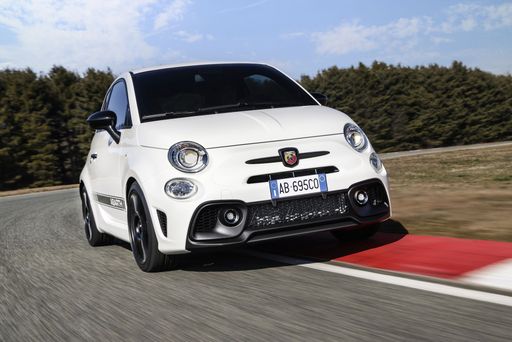 @ Abarth / Stellantis Media
@ Abarth / Stellantis Media
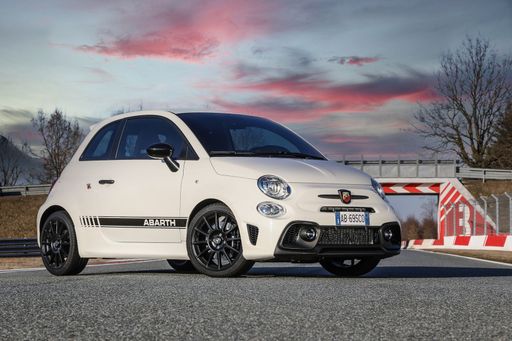 @ Abarth / Stellantis Media
@ Abarth / Stellantis Media
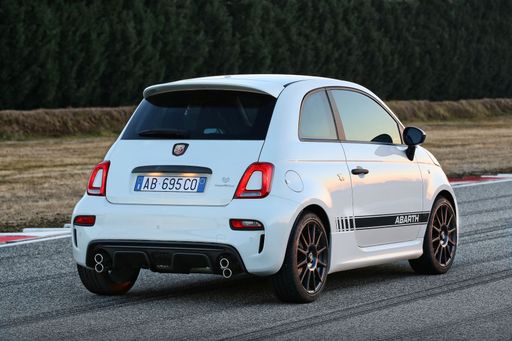 @ Abarth / Stellantis Media
@ Abarth / Stellantis Media
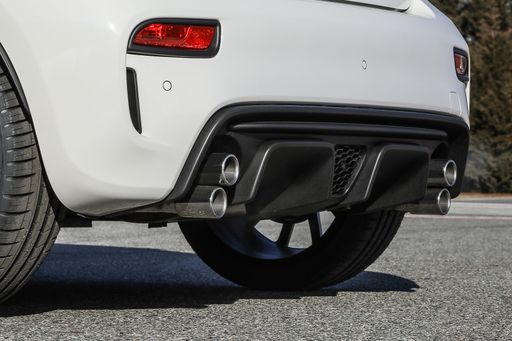 @ Abarth / Stellantis Media
@ Abarth / Stellantis Media
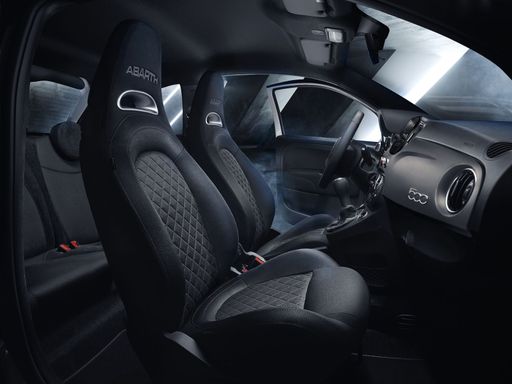 @ Abarth / Stellantis Media
@ Abarth / Stellantis Media
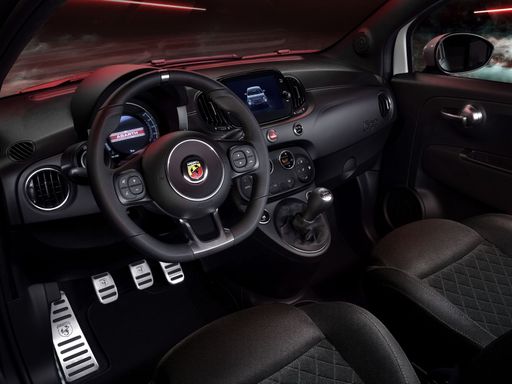 @ Abarth / Stellantis Media
@ Abarth / Stellantis Media
VW Transporter Transporter
The VW Transporter, a versatile favourite among commercial vehicles, combines practicality with modern design. Its spacious interior offers ample room for both passengers and cargo, making it a reliable choice for businesses and families alike. The vehicle's strong build and advanced technology ensure a smooth and efficient driving experience in various conditions.
details
 @ Abarth / Stellantis Media
@ Abarth / Stellantis Media
|
|
|
|
|
Costs and Consumption |
|
|---|---|
|
Price
32600 - 39400 £
|
Price
37500 - 60800 £
|
|
Consumption L/100km
-
|
Consumption L/100km
7.1 - 8.4 L
|
|
Consumption kWh/100km
17.1 - 18.8 kWh
|
Consumption kWh/100km
21.9 - 24.4 kWh
|
|
Electric Range
242 - 265 km
|
Electric Range
56 - 331 km
|
|
Battery Capacity
37.80 kWh
|
Battery Capacity
11.8 - 63.8 kWh
|
|
co2
0 g/km
|
co2
0 - 220 g/km
|
|
Fuel tank capacity
-
|
Fuel tank capacity
55 L
|
Dimensions and Body |
|
|---|---|
|
Body Type
Hatchback
|
Body Type
Cargo Van
|
|
Seats
4
|
Seats
2 - 5
|
|
Doors
3
|
Doors
4 - 5
|
|
Curb weight
1410 - 1435 kg
|
Curb weight
1872 - 2462 kg
|
|
Trunk capacity
185 L
|
Trunk capacity
-
|
|
Length
3673 mm
|
Length
5050 - 5450 mm
|
|
Width
1682 mm
|
Width
2032 mm
|
|
Height
1518 mm
|
Height
1966 - 1985 mm
|
|
Max trunk capacity
550 L
|
Max trunk capacity
-
|
|
Payload
370 - 385 kg
|
Payload
755 - 1259 kg
|
Engine and Performance |
|
|---|---|
|
Engine Type
Electric
|
Engine Type
Diesel, Plugin Hybrid, Electric
|
|
Transmission
Automatic
|
Transmission
Manuel, Automatic
|
|
Transmission Detail
-
|
Transmission Detail
Manual Gearbox, Automatic Gearbox
|
|
Drive Type
Front-Wheel Drive
|
Drive Type
Front-Wheel Drive, All-Wheel Drive, Rear-Wheel Drive
|
|
Power HP
155 HP
|
Power HP
110 - 286 HP
|
|
Acceleration 0-100km/h
7 s
|
Acceleration 0-100km/h
7.4 - 16.9 s
|
|
Max Speed
155 km/h
|
Max Speed
112 - 150 km/h
|
|
Torque
235 Nm
|
Torque
310 - 415 Nm
|
|
Number of Cylinders
-
|
Number of Cylinders
4
|
|
Power kW
114 kW
|
Power kW
81 - 210 kW
|
|
Engine capacity
-
|
Engine capacity
1996 - 2488 cm3
|
General |
|
|---|---|
|
Model Year
2023
|
Model Year
2025
|
|
CO2 Efficiency Class
A
|
CO2 Efficiency Class
G, A
|
|
Brand
Abarth
|
Brand
VW
|
Is the Abarth 500 595 695 offered with different drivetrains?
The Abarth 500 595 695 is offered with Front-Wheel Drive.
The prices and data displayed are estimates based on German list prices and may vary by country. This information is not legally binding.
